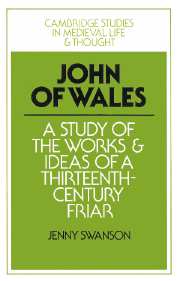Book contents
- Frontmatter
- Contents
- Acknowledgements
- List of Abbreviations
- Introduction
- 1 The career of John of Wales
- 2 The works of John of Wales: sources and technique
- 3 The Breviloquium de Virtutibus Antiquorum Principum et Philosophorum
- 4 Communiloquium, part 1: John of Wales on the state and its members
- 5 Communiloquium, parts 2 and 3: John of Wales on secular society
- 6 Communiloquium, parts 4–7: John of Wales on scholars and churchmen
- 7 Philosophers and saints: the Compendiloquium and Breviloquium de Sapientia Sanctorum of John of Wales
- 8 The works of John of Wales: spread and influence
- Conclusion
- Appendices
- 5 Checklist of early printed editions of works by John of Wales
- Bibliography
- Index
2 - The works of John of Wales: sources and technique
Published online by Cambridge University Press: 23 September 2009
- Frontmatter
- Contents
- Acknowledgements
- List of Abbreviations
- Introduction
- 1 The career of John of Wales
- 2 The works of John of Wales: sources and technique
- 3 The Breviloquium de Virtutibus Antiquorum Principum et Philosophorum
- 4 Communiloquium, part 1: John of Wales on the state and its members
- 5 Communiloquium, parts 2 and 3: John of Wales on secular society
- 6 Communiloquium, parts 4–7: John of Wales on scholars and churchmen
- 7 Philosophers and saints: the Compendiloquium and Breviloquium de Sapientia Sanctorum of John of Wales
- 8 The works of John of Wales: spread and influence
- Conclusion
- Appendices
- 5 Checklist of early printed editions of works by John of Wales
- Bibliography
- Index
Summary
John of Wales' pastoral handbooks are remarkable in many ways, and in particular for the wide variety of texts which he employed to educate his readers. His fascination with the ancient world appears to have led him to seek out an extraordinary range of sources, some of them extremely rare in his time. His use of more than fifty classical authors (and nearly 100 classical texts) establishes him as a major classicising writer for the thirteenth and fourteenth centuries, and he seems to have been an important link between the classical interests of Robert Grosseteste (d. 1253) and the wider classicising tendencies of the group of fourteenth-century English friars so vividly described by Beryl Smalley.
John was well placed to be a beneficiary of the developments in the organisation of written material which were made by the friars who prepared the Registrum Librorum Angliae. The contents of this library list were mainly patristic, so it cannot be used to account for John's wide classical learning, but it is a clear indication that English Franciscans were making advances in method, and in co-operation, from which John could well have benefited. Similarly, the Lyons Index of Robert Grosseteste, a topic index to both patristic and classical works, shows that before John of Wales joined them the Oxford Franciscans were already making a contribution to the development of reference tools.
- Type
- Chapter
- Information
- John of WalesA Study of the Works and Ideas of a Thirteenth-Century Friar, pp. 15 - 40Publisher: Cambridge University PressPrint publication year: 1989



